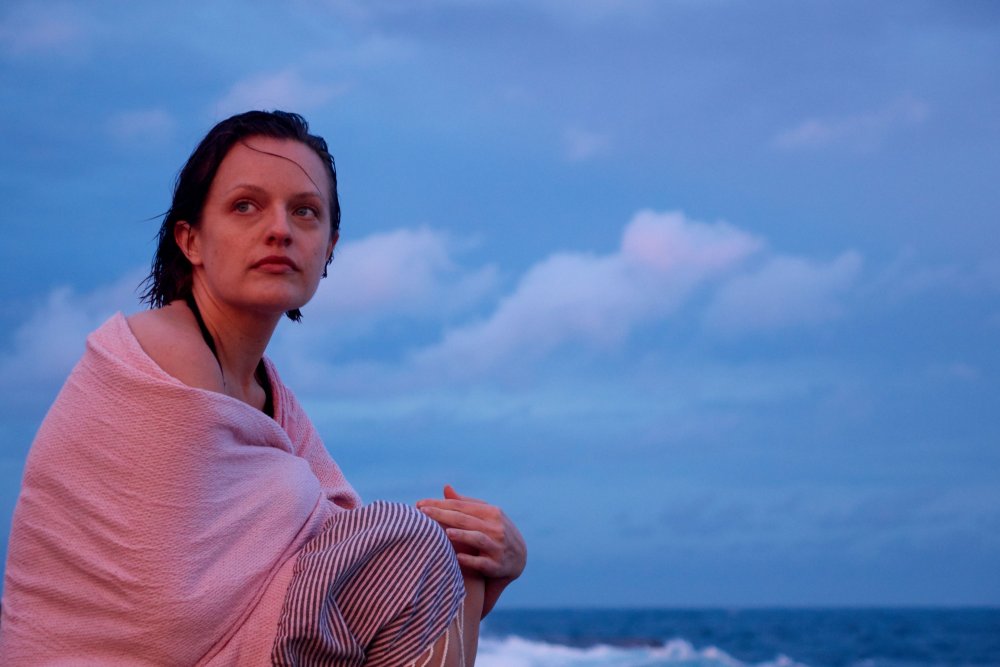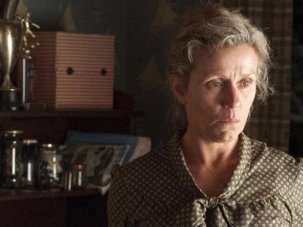Spoiler alert: this review reveals plot details in both Season 1 and Season 2.
A wedding dress catches fire, held high against the last of sunset. Long, black hair streams like vengeful seaweed from a suitcase sunk to the ocean floor. One woman welcomes another to her apartment by donning a bike helmet decorated with deelyboppers and pretending to be a space traveller. With eyes closed, a man’s face emerges from the sand of a busy beach. Behind the blur of a windshield, a woman goes wide-eyed as she sees, for the first time, the daughter she gave up for adoption 17 years ago.
Top of the Lake: China Girl is now broadcasting on Thursday nights on BBC Two, and is available to stream in full on BBC iPlayer.
Unintended consequences, returning because repressed, are the law of the sophisticated contemporary police procedural – but nowhere are they expressed with a more hallucinatory, uncanny beauty than in Jane Campion’s Top of the Lake, co-written with Gerard Lee, which returns this week for a second series four years after its first.
Each image springs from what could be called Campion’s Law, formulated in the first series by wild, spiky guru GJ (Holly Hunter, herself a hallucinatory vision of long, iron-grey hair and unblinking eyes) as: “There’s no match for the tremendous intelligence of the body.” From her first short Passionless Moments (1983) to the tubercular poetics of John Keats in 2009’s Bright Star, not to mention Hunter’s own definitional, liberatory role as Ada in the Palme d’Or winning The Piano (1992), Campion’s characters live and die by their respect for that intelligence, as she uses her own to forge indelible images. Perhaps her most famous – Ada sinking under the sea, dragged down by her own piano, and then kicking herself free – is reworked in the opening episodes of Top of the Lake: China Girl, as a suitcase sinks, releasing compressed gases in a glitter of bubbles, and then slowly – with its (tell)tail of hair – rises to the surface and is swept in, wave by wave, to Bondi Beach.

Workers at Silk 41 brothel with their landlord Alexander, and (in red) his teenage girlfriend Mary
Returning to Sydney from New Zealand’s rural South Island, the setting for series one, is painful but inevitable, both for the show and the its protagonist Robin Griffin (Elisabeth Moss), a detective with the Sydney police force who had, at the start of series one, returned to her childhood home town to see her mother, who was in the late stages of breast cancer. After four years in Laketop with the alternative family she formed through confronting the horrors of series one – including her mother’s death, her own gang-rape as a teenager, and a local paedophile ring – Robin has returned to Sydney with two compulsions: to get back to work, and to get in touch with her biological daughter Mary, conceived after the rape, whom she gave up for adoption.
Exchanging the nightmarishly tight-knit small town for a sprawling city changes the show’s aesthetic, shape and pacing, while still keeping the tightly wound, immensely engaging Robin at its centre. Gone are the mythic resonances of the intimate family tragedy of series one, which Amy Taubin incisively mapped on to no lesser text than Aeschylus’s Oresteia; in fact, one of series two’s new characters, Isidore, the girlfriend of Mary’s adoptive mother Julia, is a French teacher much given to seeing grand allegory and the hero’s journey in everything, especially Mary’s most dangerous behaviour. That’s not to say that the new series is all on the surface: Campionesque depth-charges, such as the repeated trope of gates and railings coming between characters, and the ascent and descent of staircases (also a strong marker of the protagonist’s emotional arc in In the Cut (2003)), retain their presence and power, but the procedural and the polemic are further forward – as are physical and verbal humour, however dark.
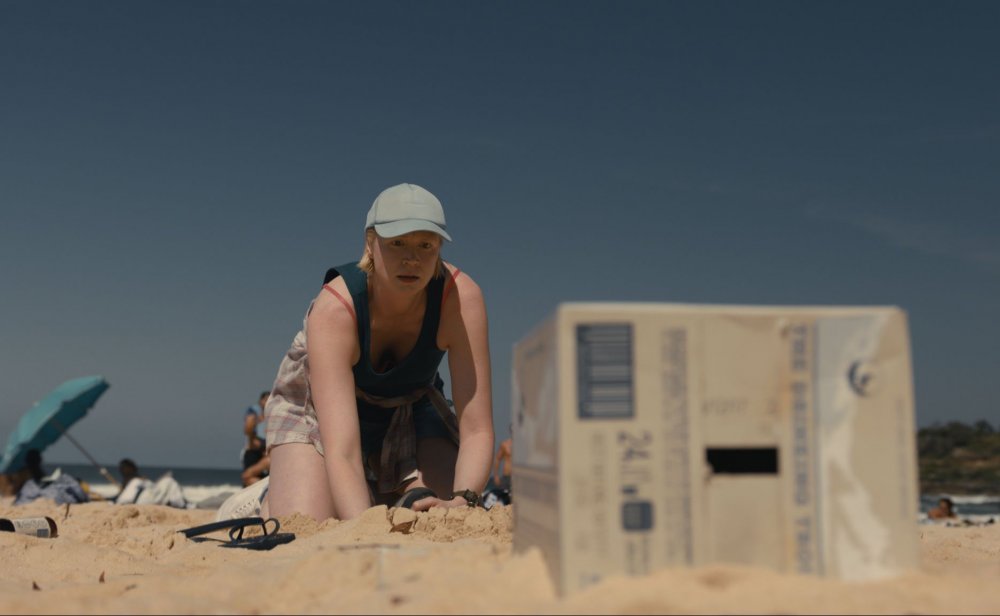
Gwendoline Christie as Miranda
That’s particularly evident in the scenes between Robin and under-sufferance policing partner Miranda. More than a foot taller than Moss, Gwendoline Christie gives vim and brio to what could have been a one-joke role, filling Miranda with surprising passion alongside her space-helmet silliness. As Robin’s friendship with Miranda develops, it becomes clear that the personal complexities and complicities of policing Sydney are no less than those of policing Laketop; Robin’s new boss Adrian may not be the head of a paedophile ring like Laketop police chief Al Parker, but neither he, nor Miranda, nor Robin, nor Robin’s new family – including her estranged brother Liam, as well as her tentative relationship with Mary and her parents – will be untouched by the investigation into the corpse dubbed ‘China Girl’ on the basis of her waist-length black hair.
Robin’s detective work leads her to the meeting point of Sydney’s legal sex trade and an illegal surrogacy trade (the latter narrative clearly informed by the case known as Baby Gammy, after the child left in Thailand with its surrogate mother by its Australian parents, which received global media attention). Complicated by illegal student visa applications and continuing financial exploitation, the legal sex trade tests Campion’s own belief in the intelligence of the body, and offers a dramatic testing ground for her feminist vision of the law of the body – which, for her, always combines desire and autonomy – and the state’s attempt to legislate the body. This confrontation reaches a crisis in episode four, when Mary turns 18 and her 42-year-old boyfriend, the series’ shadiest male character (a closely fought title with seemingly endless contenders), persuades her that she can only express her adulthood, her love for him, and her fellow feeling for the women who work in the brothel in the building he owns, by doing sex work.
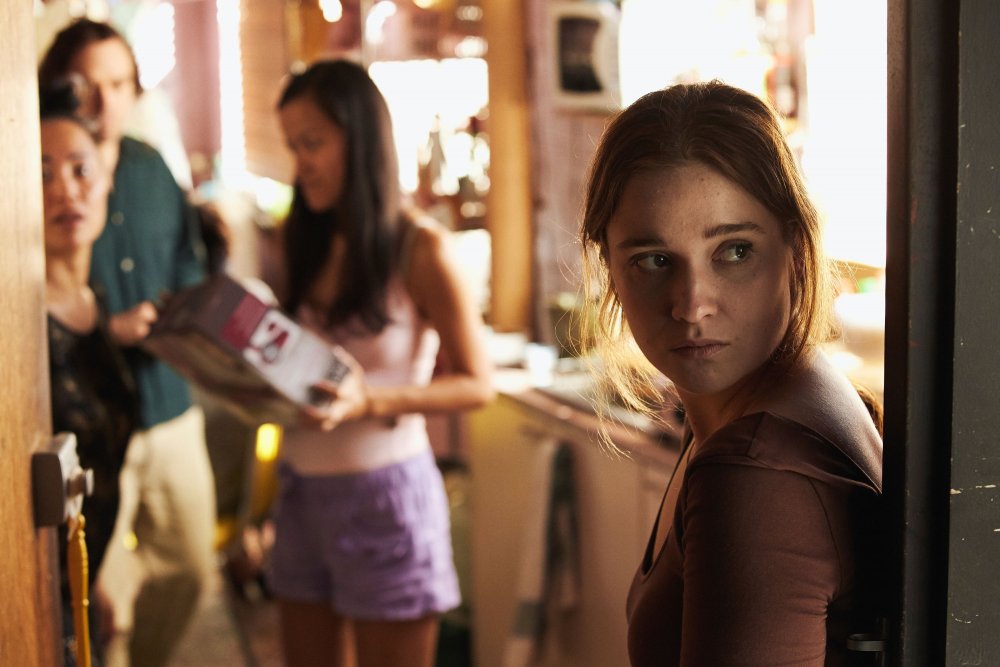
Alice Englert as Mary
That Mary is played, with feral absoluteness, by Campion’s own daughter Alice Englert is just a token of the show’s intensity. Englert is particularly superb in the scenes where she faces off with her adoptive mother, played by longtime Campion collaborator Nicole Kidman, who played the lead in 1997’s The Portrait of a Lady (another character whose desire leads her to comprise, and then regain, her autonomy) and produced In the Cut.
Kidman’s Julia is a welcome conundrum: a brittle feminist given to fits of the vapours, grossly selfish in her overwhelming need for her daughter’s love, and yet a persuasive, charismatic teacher. When the first images of Kidman in the series were released, many pegged her as the structural equivalent to Hunter’s GJ, because of her grey hair and direct gaze. But Julia has more in common with Robin’s mother Jude, also a difficultly, demandingly wise woman. GJ’s imperative, insightful role is taken – in some ways – by another grey-haired character, Ray, the pathologist with whom Robin works on the China Girl case. Ray fondly calls the detective Robbie, and (like GJ) offers her a place to lie down when she is at her lowest ebb.
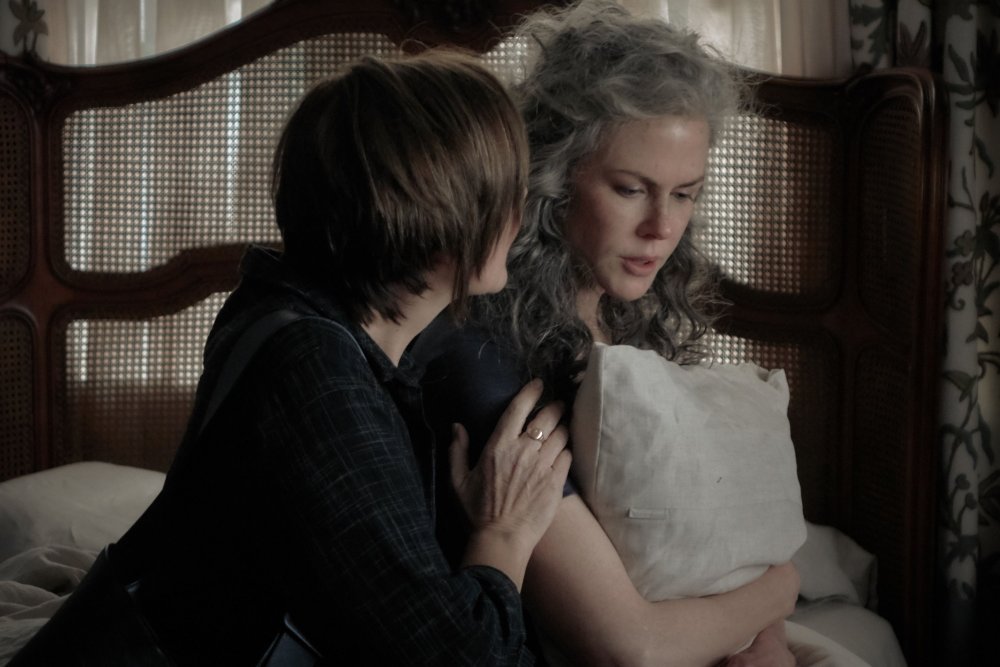
Nicole Kidman as Julia
Having taken a male lover at 50, Ray adds to Campion’s portrayal of Sydney as a more diverse, tolerant world than Laketop, even as it’s insistently strafed by the same misogyny and racism, however more urbanely expressed. Campion sets up two choruses against each other: the predominantly Thai sex workers at the brothel known as Silk 41, led by tough, clever mama-san Dang; and a group of (predominantly white) men who run a sex-worker review website from a café. The first group articulates the physical and economic realities of sex work, in all their particularly postcolonial and globalised complexity; the other performs lonely fantasies (for each other) that lead one member, Brett, to explosive violence.
But it’s Mary’s boyfriend Alexander, known as Puss, the landlord of Silk 41, who offers the most vexing of expressions: a bitter, Nietszchean libertarian, he is internally and perpetually twisted by class rage at his father, an aristocrat who raped his servant mother. Robin’s final confrontation with this trollish embodiment of the times will have viewers cheering. She delivers a perfect, verbal rebuttal to his seemingly impermeable grooming tactics, reducing him to a scared child.
Still, for all Alexander’s ridiculous and exploitative behaviour, he is small fry compared to the two true nightmares that Robin faces. The first is the return of another Al, police chief Parker, who not only survived her direct gunshot at the end of series one, but turned state witness against the men whose sexual assault of children he had enabled, escaped a jail sentence, and is now pressing a civil case against Robin. His appearance in episode three culminates in a scene of such heart-stopping drama and brutal catharsis that the final episodes of the show struggle to match it.

Elisabeth Moss with David Wenham as former police chief Al Parker
However, what they do offer – after Robin has been to this particular hell and back – is the provisional, careful resolution of her other greatest, and more pervasive, fear: the literally gut-wrenching anxiety caused by her desire to be a mother, which prompts vivid dreams featuring living foetuses. Before the wedding dress burns back in Laketop, Robin tells her friends Delia and Narelle that she has suffered three miscarriages in four years; in a Q&A at the BFI after a preview of the first two episodes, Campion said she had experienced three miscarriages, and the new series is as intensely invested in excavating and graphically representing the often-silenced grief of miscarriages and unsuccessful IVF as the first series was in confronting the impact of sexual assault.
Robin’s body is, as ever, the nexus of all of this. Episodes four and five feature frequent comments by other characters on the visible marks of violence that she has sustained from confrontations with the two Als (“That’s people teeth,” remarks Miranda in the pithiest of such comments). Even Robin’s brief celebratory/commiseratory evening of drinks and consensual, pleasurable sex with Mary’s adoptive father Pyke has far-reaching physical consequences, including the striking image of a police officer breathalysing herself. Such specific physical details are not just visual or incidental; the series is driven by the narrative implications of such laws of the body as the effects of alcohol consumption, contraception and ballistics. Where other police procedurals often take a simultaneously forensic and spectacular approach to our bodies’ vulnerability to what enters it, Top of the Lake – personified expressively by hippie pathologist Ray – is utterly focused on the emotional, as well as physiological and legal, consequences.
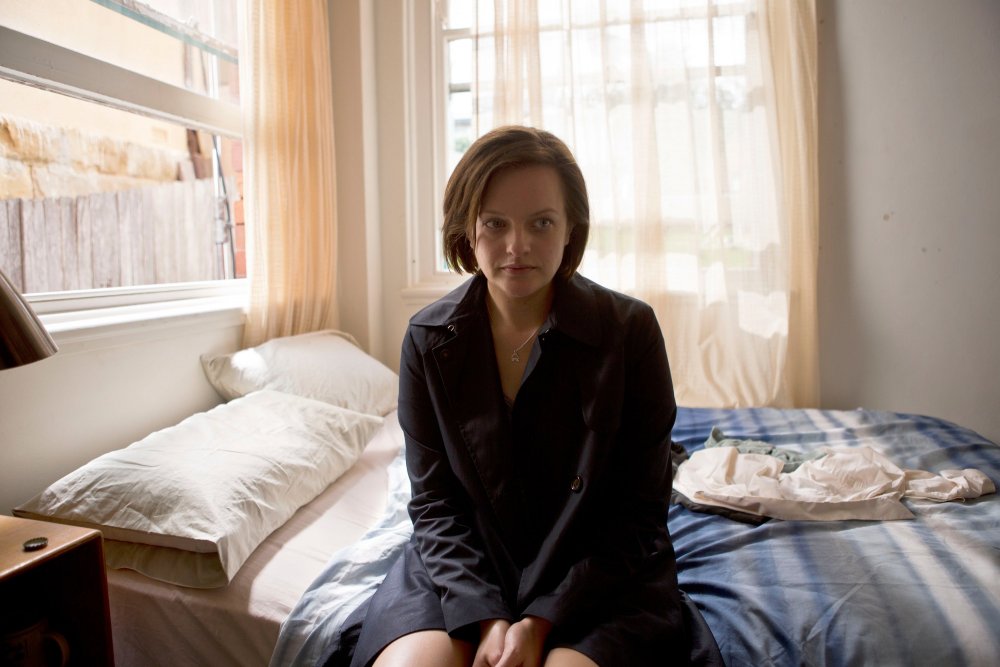
Elisabeth Moss as Robin Griffin
That focus would be nothing without meeting its match in the central performance by Elisabeth Moss, whose first outing as Robin Griffin four years ago showed a hitherto-unexpected ferocity of purpose and physicality. Regularly drunk, permanently heartbroken, and frequently assailed by come-ons from other detectives and even her daughter’s sleazy boyfriend, Robin tries to bear these slings and arrows via GJ’s gift of the tremendous intelligence of her body in a hard, cynical world that mocks rather than respects it. Yet it is her persistence – given Moss’s almost manga-like eyes, what could be called her persistence of vision, her refusal to look away from the most distressing images so she can see their connections and implications – that bridges the gap between the law of the body and the state’s inadequate legislation thereof.
Neither vengeful Fury nor placatory Eumenide (to think in terms of the third play of the Oresteia, in which charges are brought by the Furies against Orestes for his mother’s murder), Robin stays absolutely true to Campion’s Law, even when it makes her vomit. She is rewarded, in the closing minutes of the series, by Mary’s flight from Alexander and her smile of recognition – and, with a last-second knock at the door, by the promise of further opportunities to set the world to rights. Robin’s small, barely furnished, fiercely guarded small corner of that world, as close to Bondi and its depths as she previously was to Lake Wakatipu, once again ends up repopulated by an awkward, alternative family, scarred by tragedies that are not fully resolved. Top of the Lake still has much to pull up from its – and our – depths, its bruising confrontations with the law of the body given shape and intensity by Jane Campion’s tremendous intelligence.
In the August 2017 issue of Sight & Sound
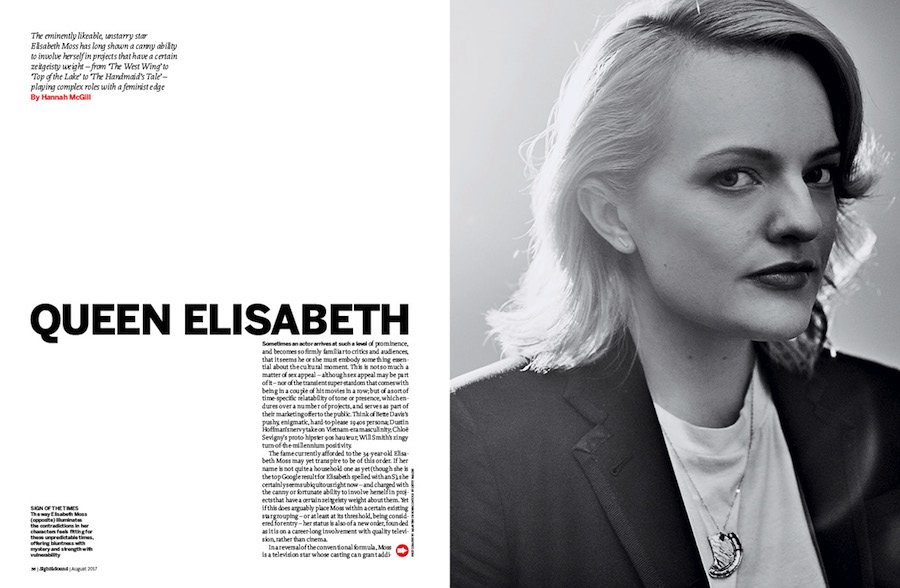
Queen Elisabeth
The eminently likeable, unstarry star Elisabeth Moss has long shown a canny ability to involve herself in projects that have a certain zeitgeisty weight – from The West Wing to Top of the Lake to The Handmaid’s Tale – playing complex roles with a feminist edge. By Hannah McGill.

+ Evil under the sun
Elisabeth Moss explains the lure of the vulnerable but badass detective she plays in Jane Campion’s pitch-black crime mystery television series Top of the Lake: China Girl. By Isabel Stevens.
+ Feminist wiles
Top of the Lake: China Girl director Jane Campion discusses television, maternity and the Australian sex industry – and how she took advantage of David Lynch in Cannes. By Isabel Stevens.
-
Sight & Sound: the August 2017 issue

Christopher Nolan on Dunkirk and real film, plus Sofia Coppola on The Beguiled, Jane Campion and Elisabeth Moss on Top of the Lake and Jean-Pierre...
Elisabeth Moss and Jane Campion talk Top of the Lake in our August 2017 issue
-
The Digital Edition and Archive quick link
Log in here to your digital edition and archive subscription, take a look at the packages on offer and buy a subscription.




